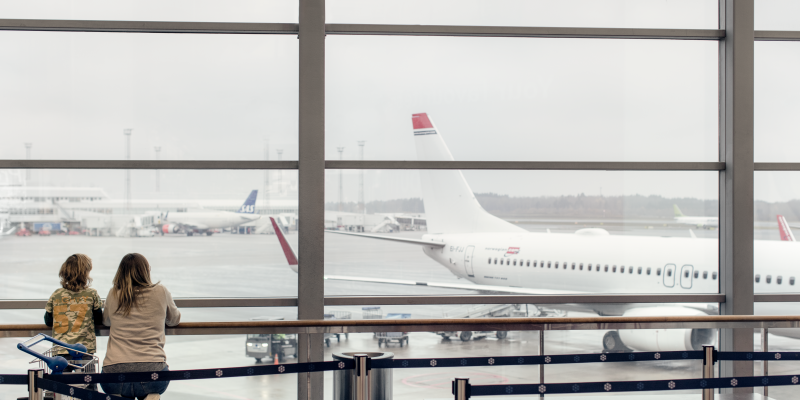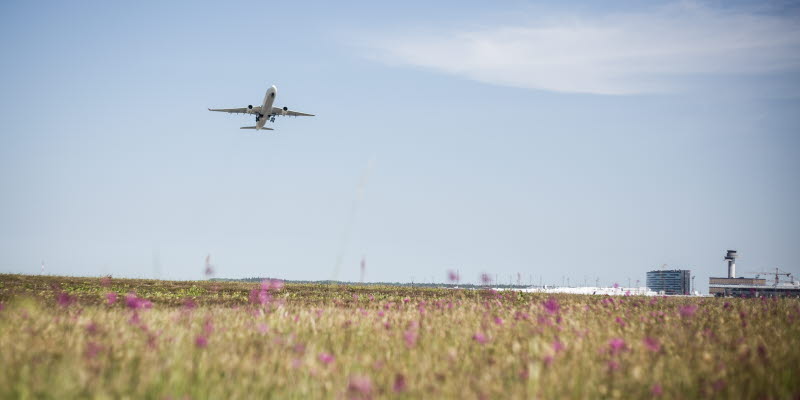Environment
Environmental issues are a priority at Swedavia, and Umeå Airport works continuously in a number of different areas to reduce its environmental impact. In autumn 1999, Umeå Airport was the first airport in Sweden to be environmentally certified.
Swedavia's climate work

Our zero vision
In 2020, Swedavia achieved the company’s goal of no fossil carbon dioxide emissions from airport operations run under our own management.
Extensive work underpins our success in achieving zero fossil carbon dioxide emissions. We purchase green electricity for all our operations, the back-up power supply runs on hydrotreated vegetable oil (HVO), our vehicle fleet runs on HVO, fossil-free gas or green electricity, and we purchase liquefied petroleum gas (biogasol) and biogas.
Expanded climate work
All of Swedavia’s airports are accredited at the ACA 4+ level in accordance with Airport Council International (ACI) Europe’s standards for the climate work of airports. That means our airports continuously reduce fossil carbon dioxide emissions from their own operations, offset the emissions that have not yet been reduced and help other businesses operating at the airports to reduce their emissions. At the end of 2020, we achieved our fossil carbon dioxide emissions goal for airport operations run under our own management.
The next goal is to have all the airports accredited at the ACA 5+ level, which means that compounds to de-ice runways/aircraft and coolants are to be included in the measurements. We shall also work to a greater extent to engage and work together with other companies and organisations that have significant carbon dioxide emissions at the airports in order to continue reducing emissions together. Over time, all the operations at our airports will switch to renewable energy sources. This work is in line with the International Panel on Climate Change’s goal not to exceed a 1.5 degree rise in global warming as well as Swedavia’s strategy and goals for proactive climate change adaptation.
Facts about Airport Carbon Accreditation (ACA)
- Airport Carbon Accreditation is a framework within Airport Council International (ACI) which evaluates airports' work with handling and reducing their carbon dioxide emissions. The framework has six levels.
- The set certification requirements for ACA4+ includes adapting the airport's handling of carbon dioxide to the Paris Agreement as well as an inclusion of further emission sources in the airport's climate footprint that covers all considerable operational emissions from a third party. The emphasis is on creating effective partnerships with airport actors to reduce emissions. The initiated partnership plan that contributes to the change for the airport's partners as well is a prerequisite for the certification.
- Six of Swedavia's ten airports have been certified at the highest level, ACA5+; Stockholm Arlanda Airport, Göteborg Landvetter Airport, Malmö Airport, Åre Östersund Airport, Visby Airport and Kiruna Airport. The four remaining airports - Bromma Stockholm Airport, Luleå Airport, Umeå Airport and Ronneby Airport - will be certified according to ACA4+ during 2023 and 2024.
- Stockholm Arlanda Airport was one of 17 airports that joined the framework at its start in 2009. Göteborg Landvetter Airport joined in 2010. Both airports were immediatly put in the, then, highest level of the framework, ACA3+ and Swedavia became the first airport concern in the world to become fossil free in their own operation at the end of 2020. Stockholm Arlanda Airport also became the first airport to accept ACI's newly constituted ECO Innovation Award in 2010, a distinction the airport also received in 2021.
Environmental impact and projects

At Umeå Airport, work is continuously carried out to reduce its environmental impact, and the airport puts great emphasis on working with environmental issues in a structured and systematic way.
The are also a number of environmental projects underway at the airport. You can read about them below.
Electric aircraft
In 2025, a feasibility study on future energy needs will be carried out so that more energy can be ordered for the airport from local energy companies and a plan can be developed for local infrastructure to satisfy future needs for charging points for commercial aircraft. Two students from Linköping University will also separately carry out work for their degree related to these questions about the future and the airport’s transition to fossil-free aviation.
Local energy hub
In 2025, a feasibility study will investigate the possibility of developing the airport into an energy hub by installing solar panels in the immediate vicinity of the airport. The aim is to produce a surplus of energy, more than the airport consumes today and is expected to use in the future, to meet the needs of tomorrow for electric charging points for commercial aircraft and vehicular traffic.
FFFLY
Swedavia and Umeå Airport have been partners in the Municipality of Umeå’s fossil-free aviation project FFFLY. The project has involved analyses and preparation of an action plan for how air transport to and from Umeå can be made fossil-free using sustainable aviation fuel (SAF), electric aircraft, hydrogen gas and electrofuels. Swedavia, through John Nilsson, has been responsible for Work Package 2, dealing with electric aircraft, in which we looked at the possibilities and needs for establishing charging infrastructure for electric aircraft at Umeå Airport.
FLYH2UME
The hydrogen project aims for Swedavia AB, through Umeå Airport, to serve as a model for medium-sized and small airports regarding which infrastructural preparations and infrastructural investments need to be carried out locally at the airport, so that in the near future the airport will be able to handle hydrogen safely, both within a depot/storage area and during the refueling process of aircraft.
Climate roadmap
Umeå Airport has signed onto the Municipality of Umeå’s climate roadmap and, among other moves, has become involved in the strategic group for communication and transport.
Read more here (in Swedish).
Bicycle Garage
Umeå Airport is making strong efforts to ensure that transport to and from the airport is as environmentally friendly as possible. In the spring of 2013, Umeå Airport opened its bicycle garage, much to the delight of travelers who prefer to cycle to their flights. In 2024, the airport also added a parking area for e-scooters next to the bicycle garage. According to our investment portfolio, there are plans to further expand the bicycle garage in 2027.
PFAS
Perfluorinated substances (PFAS) have been used in firefighting foam at Umeå Airport. The airport has carried out several investigations to understand the contamination situation and is actively working on the issue, with the goal of reducing the amount of PFAS from the airport. To monitor the status of the Ume River, the airport is a member of the Ume and Vindel Rivers Water Conservation Association for coordinated recipient monitoring and control.
Environmental management system
Certification entails not just satisfying the requirements of environmental authorities but also meeting the general environmental goals and specific environmental targets set for Umeå Airport.
Both internal and external environmental audits are conducted at the airport. The aim of these audits is to verify that the environmental management system is being used and is both sufficient and effective. Continuous improvement work is under way, entailing more rigorous requirements, which means that each year there are also more stringent environmental goals and targets.
Environmental reports
Environmental report 2024 (pdf, in Swedish)
Appendix 1 – Water (pdf, in Swedish)
Appendix 2 - Waste (pdf, in Swedish)
Appendix 3 – Drinking water (pdf, in Swedish)
Purpose and objectives
Swedavia owns, operates and develops airports and properties near these airports in Sweden. We strive to continuously improve our management system (ISO 14001) to minimize our environmental impact and use resources in a sustainable manner throughout the value chain. This is done
primarily by reducing greenhouse gas emissions, minimizing other atmospheric emissions and discharges to soil and water and minimizing the use of harmful chemicals. We shall even secure effective management of resources in order to contribute to circular economy and continuously work
to improve energy efficiency.
For us, it is a given that we comply with environmental and energy statutes in effect as well as other applicable national and international regulations and requirements. It is also a given that we ensure access to the information and resources required to achieve our environmental and energy objectives
and targets. We shall also work to limit aircraft noise and emissions from aircraft operations.
In order to achieve this, working in accordance with the following
fundamental rules is required:
- Environmental concern is integral to every part of operations and is taken into consideration in every decision.
- The most important environmental issue for the aviation and real estate sectors is their climate impact, and this must be given priority in decisions and activities.
- We shall continuously improve energy efficiency and manage our own operations as well as influence other companies and organizations that we interact with for the sustainable use of resources.
- We shall purchase energy-efficient products and services and promote construction that leads to better energy performance.
- All of Swedavia's employees shall take part in our environmental and energy work.
- We shall assess and manage environmental risks and energy performance in a systematic manner.
- Swedavia shall take an active part in local, regional, national and international work in order to reduce the aviation industry's negative impact on the environment and work for the sustainable development of airports.
Track flights

One public tool available for use is Flightradar24.com.
The Webtrak tool that we previously made available here on our website is being reviewed, and we are exploring the possibilities of using other data sources. This is in order to once again enable people living in the vicinity of our airports to track air traffic movements and link this information to aviation noise measurements where available.
